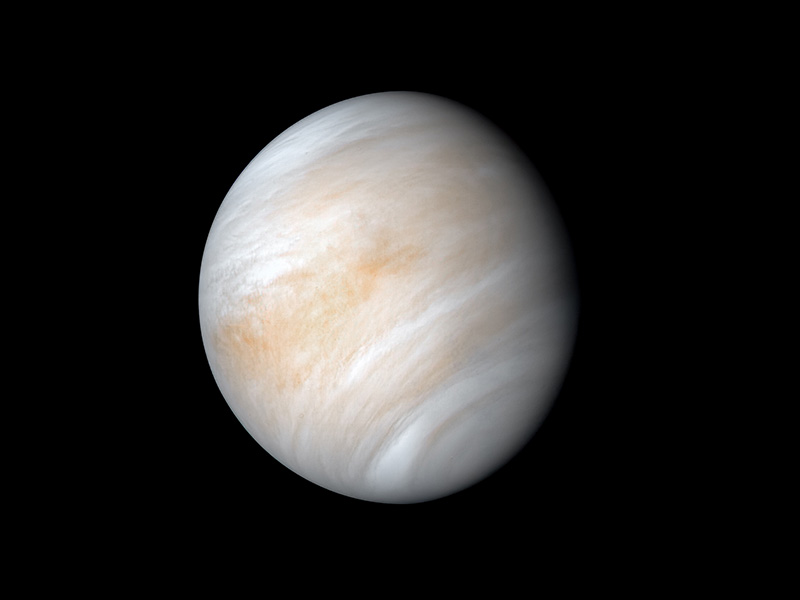We recently examined how and why Saturn’s largest moon, Titan, could answer the longstanding question: Are we alone? It’s the only moon that possesses a thick atmosphere and the only planetary body other than Earth (so far) that has liquid bodies on its surface. These characteristics alone make Titan an enticing location to search for life beyond Earth. In contrast, what if life were to be found in one of the unlikeliest of places and on a planet that is known to possess some of the harshest conditions ever observed? That planet is Venus, the second planet from the Sun, a hellish planet with scorching surface temperatures of approximately 475 degrees Celsius (900 degrees Fahrenheit), which is hot enough to melt lead, and crushing pressures greater than 90 times that of Earth.
As far as we’re concerned, nothing can survive on the surface of Venus. These conditions are the result of a runaway greenhouse effect , which causes the planet to trap the incoming sunlight, thus resulting in its inhospitable environment. Despite this, scientists hypothesize that Venus used to exhibit much more Earth-like conditions billions of years ago .
Given its present state, what makes Venus so intriguing for astrobiology and finding life beyond Earth? “Venus is the poster child of a planet gone wrong,” said Dr. Paul Byrne, an Associate Professor of Earth and Planetary Sciences at Washington University in St. Louis.
“On paper, it has the same properties as Earth—same size, made of presumably the same materials in about the same proportions, same age, etc. So why is its climate and surface so different? There’s another angle: a few tens of kilometers up in the Venus atmosphere the pressure and temperature are close to those at sea level on Earth. Is that environment habitable? Understanding why Venus is the way it is will be crucial for understanding why our own world is the way it is… and why it isn’t like Venus.
” Remove All Ads on Universe Today Join our Patreon for as little as $3! Get the ad-free experience for life As recently as 2018, scientists proposed the possibility of life in the clouds of Venus, with NASA later approving two missions in June 2021 to explore Venus in the 2030s, DAVINCI+ and VERITAS. The goal of DAVINCI+ will be to examine the evolution of Venus’ atmosphere while also taking high-resolution images of the surface. The goal of VERITAS will be to map Venus’ surface in hopes of better understanding its geological history.
“These missions, together with the European Space Agency’s EnVision mission, will open up a whole new chapter in our study of Venus,” said Dr. Byrne. “VERITAS and EnVision will reveal the surface as never before, and DAVINCI will tell us of the past climate history of the planet.
I don’t know what we’ll learn, but I know it’ll be groundbreaking… including in terms of our understanding of planetary habitability, and where to look for evidence of life elsewhere in the universe. ” Despite its hellish landscape, Venus could help us better understand how Earth could end up if we let our own climate get carried away, while also allowing us to learn about life in varying environments, such as its atmosphere. Either way, the coming years could teach us much more about this interesting world.
“Venus used to be the focus of planetary exploration, with far more missions dispatched there (not all of them successfully) in the 1960s–1980s than to Mars,” said Dr. Byrne. “But interest in Venus waned around the time we started getting good at landing and roving on Mars.
Now, with these new missions, and new insights into planetary habitability from across the Solar System and even beyond, it’s time to get back to Venus. I hope the recently selected three missions (VERITAS, DAVINCI, and EnVision) are only the beginning of a new era of Venus exploration. ” And with this, we wonder if Venus will finally answer, “Are we alone?” As always, keep doing science & keep looking up! Featured Image: NASA’s Mariner 10 captured this image of Venus in February 1974 as it traveled away from the planet.
(Credit: NASA/JPL-Caltech).
From: universetoday
URL: https://www.universetoday.com/158155/will-venus-finally-answer-are-we-alone/



